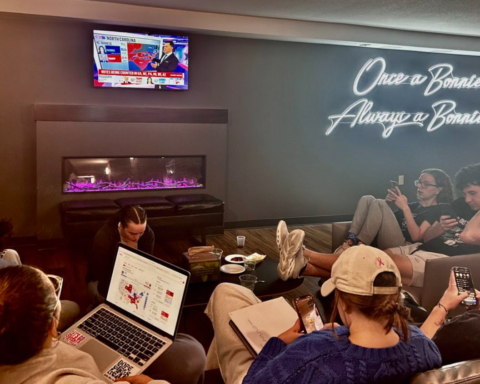Honoring colored artists more than ever before
The Academy Awards made its mark this past Sunday without a host for the first time in 30 years. Most viewers were expecting a train wreck, but the show went surprisingly well. Sites like Vogue, Vulture and Vice Media agreed that the Oscars should never have a host again, and for good reason. The show was shorter and more productive. It felt more professional and prestigious with the lack of comedic fluff, which is fitting for the king of award shows.
Another monumental victory for the Oscars was its departure from the #OscarsSoWhite movement that arose on Twitter a few years ago. This year’s ceremony was the most diverse it’s been in years. Costume designer Ruth Carter and production designer Hannah Beachler, who both worked on “Black Panther,” became the first ever African American winners in their categories. Regina King won Best Supporting Actress for her role in “If Beale Street Could Talk.” Mahershala Ali also won best supporting actor for “Green Book.”
Perhaps the most moving win of the night was Spike Lee’s. It’s been 30 years since his empowering racial film “Do the Right Thing” went without a nomination while the patronizing “Driving Miss Daisy” won Best Picture. On Sunday night, Lee won his first Oscar ever in the Best Adapted Screenplay category for “BlackkKlansman.”
His speech served as a thank you to the women who have helped him get to where he is today, as well as an important reminder that enslaved people were forcibly brought to America 400 years ago this year.
Also, Rami Malek, the son of Egyptian immigrants, won Best Actor for his portrayal of Freddie Mercury in “Bohemian Rhapsody,” and Alfonso Cuaron from Mexico won Best Director for “Roma.”
While the 2019 Academy Awards took a huge step forward in inclusiveness, waves of disappointment and protest over Best Picture rang out soon after. While winner “Green Book” is about an interracial friendship that forms during a time of segregation, its virtuous premise is also its problem.
The Academy continuously applauds films where Caucasian characters learn from African Americans and become better for it. These are stories where issues of racism become resolved. In the end though, they’re really about the white person. Either the Academy is beginning to try a little too hard to impress everyone, or it remains a bit ignorant. Perhaps a film solely based on its quality of excellence would have been the best choice here.
Other winners include Olivia Colman from “The Favourite” for Best Actress, “Spider-Man: Into the Spider-Verse” for animated feature film, “Roma” for cinematography and foreign language film, “Free Solo” for documentary feature, “Period. End of Sentence” for documentary, “Bohemian Rhapsody” for film editing, sound editing and sound mixing, “Vice” for makeup and hairstyling, “Black Panther” for original score, “Bao” for short film, “Skin” for live action short film, “First Man” for visual effects and “Green Book” for original screen play.
All in all, it was still a pretty successful night. A record-breaking 15 women won Oscars this year (three more than the past record, and nine more than last year), including Lady Gaga for best original song “Shallows” from “A Star is Born.” Her emotional reaction and speech, along with her live performance with Bradley Cooper, were the best parts of the night.
Gaga’s growth as a musician and actress, mixed with her talent and superstar power, make her a true winner. Being one of the best movies of the year, with by far some of the most impressive performances, “A Star is Born” really deserved this one.
The Oscars did a lot of things right this year, including deciding not to give out any awards during commercial breaks, not having a host (or scurrying to find one after original host Kevin Hart quit soon before) and awarding those who have worked so hard, no matter the color of their skin.
By Vanessa Donadio, Contributing Writer
donadivj17@bonaventure.edu






